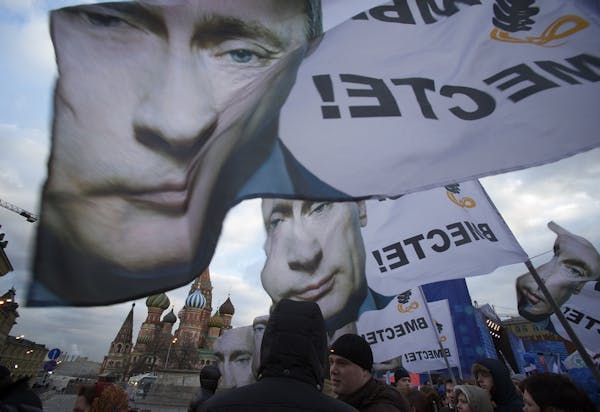Arming Ukraine, as this newspaper, prominent Washington think tanks and Sen. John McCain have argued, may be right. The case for doing so appears compelling. The country is being savaged by a bullying Russia, thousands are dying, and President Vladimir Putin's redrawing of political boundaries is violating the political order in Europe. However, the matter of arming or not arming the authorities in Kiev ends up being the wrong issue, or at least a premature one. What should come first is some thinking through of the broader problem of Russia and its neighbors, where American interests lie, and what capabilities we have. These represent the harder work of formulating a strategy.
Putin has one.
He aims to promote Russia's welfare and role in the world by keeping its neighbors away from the West. No more creep of the European Union or NATO further into the former Soviet bloc, which his foreign minister, Sergey Lavrov, declared in 2008 to be Russia's zone of "privileged interest." Roughing up and punishing Ukraine is a means to that end. It sends a blunt message to all of the neighbors about where their interests had better lie — or else. Seemingly over-the-top Russian actions caution Europeans, whose reluctance to challenge Moscow goes all the way back to German unification in 1990 and before, against further outreach to the east.
That's what the mauling of Georgia was about in 2008. It's why Moscow has supported criminal separatists in tiny Moldova since 1991. These priorities lie behind more subtle policies, too. Russia's arming of both Azeri and Armenian forces around the disputed Nagorno-Karabakh region reinforces the protagonists' dependence on it and therefore the Kremlin's role in the Caucasus. Promoting a Eurasian Economic Union that now includes Armenia, Belarus, Kazakhstan, Kyrgyzstan and Tajikistan keeps them commercially focused on Russia and reduces their options elsewhere. Putin's making nice to friendly regional autocrats who dislike Western hectoring about human rights and democracy is an easy gesture that fits this strategy, too.
Is arming Ukraine the right response? Maybe, but steps to do so should flow from a broader policy and strategy regarding that country and Russia. It is not enough to give arms to help Ukraine better protect itself or to hope that doing so will convince Putin that aggression will not go unchecked. What happens if this military aid is not sufficient to make a difference — what do we do then? What does "checking" aggression mean, and where might it end? It isn't appeasement or cowardice to insist on thinking through the implications of confrontation with Russia in its back yard — any more than it would be wise blithely to disregard the risks of failing to take a stand now against Kremlin aggression.
We need at least some semblance of a strategy on all this — a plan of action that relates what we would like to see with what our capabilities are for realizing that outcome. It should address a number of questions.
What are America's interests with respect to Ukraine, what are Russia's and where are our trans-Atlantic allies? How should the fact that the Kremlin retains thousands of nuclear warheads affect our calculus? What are Ukraine's inherent attributes and problems, and how can we affect those? Is that country sui generis, or should U.S. policy also focus on Georgia and/or others among the former Soviet states — and, if so, which ones, and what do we then make of their democratic and other failings? What other ways could we add to the pressures Putin faces already — with regard to Syria, Russia's energy markets in Europe or even relations with China — to influence his behavior?
What risks elsewhere in the world — for example, on the Iran nuclear issue — might we run by taking a more robust stance against Putin's actions, and how can we mitigate these? If we lack sufficient military or other instruments to affect developments, how can we add to our capabilities and undermine the other side's? If there is a problem with public support for a robust policy on Russia in the United States and Europe, how can that be changed — not in the firmament of partisan politics, but in reality?
This is not to argue that military support for Ukraine is a bad idea. It may be a very good idea. A compelling case can be made that the United States and its trans-Atlantic allies need fundamentally and in every way to resist Kremlin aggression and efforts to subjugate Ukraine and other neighbors — to recreate in some measure a Soviet Union-like entity whose collapse 23 years ago represented a great windfall for security and prosperity in Europe and all over the world.
But the U.S. government needs to have worked up some kind of strategy on Russia and explained it to the American people. And if we're not prepared to go a very considerable distance down the road of confrontation with Russia, then we should be careful about adding to expectations in Kiev that we may ultimately not be prepared to follow through on.
Ross Wilson, a Minnesota International Center board director, served as U.S. ambassador to Turkey and Azerbaijan during a 30-year career in the U.S. Foreign Service.
Readers Write: Caucus system, state Sen. Nicole Mitchell, voting for RFK Jr.
Turn off cellphones in state's classrooms
How many hostages are still alive? Hamas doesn't seem to know


